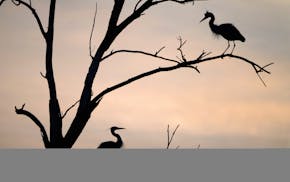LAKE OF THE WOODS, ONTARIO - Seventeen years after Ted and Bud Burger sold their namesake Twin Cities sporting-goods stores, they are doing what they always did.
Except now they will do it from an island cabin.
"We hunted and fished when we were working, and we still do," Bud said one day last week.
But the identical twins who grew up in the Twin Cities might in the end be remembered less for their field skills -- polished though they are -- than for their groundbreaking retail outlets, which presaged a nationwide shift to sporting-goods megastores such as Cabela's and Gander Mountain.
In fact, the brothers' six stores, when purchased by the third generation of the Erickson family of Holiday gas and convenience store fame, became the flagship outlets for the Gander Mountain chain of outfitters that stretches across the country today.
"When we opened our first store at 44th and France in Edina in 1970, we were 25 years old and had one employee," Bud said. "When we sold the stores in 1995, we were 50 years old with 400 employees."
Added Ted: "And having one employee was easier."
Because the brothers pursued hunting and fishing so intently, they knew which equipment was needed for which activity, and knew also the difference between high- and low-quality gear.
"Our passion was good equipment, and the people who used it," Bud said.
When the Burgers first opened their doors -- after simultaneous stints in the Air Force during the Vietnam War -- Twin Cities competitors included Joe's Sporting Goods, then at Como and Dale in St. Paul, Gokey's in downtown St. Paul and EMS (Eastern Mountain Sports) in Roseville, among a handful of others.
Certainly the late Joe D. Rauscher, owner of Joe's Sporting Goods, was an avid sportsman who hired qualified people (the current Joe's, at Hwy. 36 and Rice Street in St. Paul, is similarly operated by his sons, Joe and Jim).
Still, a vacuum existed in 1970 on the Twin Cities' west side for a high-quality sporting-goods outlet.
The Burgers' first store was built on stilts, of a sort, with customer parking underneath.
"There were 14 steps to get up to the store level," Ted said. "We figured if a guy couldn't climb 14 steps, he probably wasn't going to hunt or fish much anyway."
Operating that single outlet was challenge enough. Expanding their Twin Cities footprint would be more difficult still.
But the future they envisioned for retail sporting goods entailed multiple, bigger outlets offering even wider equipment selections.
Critical to the success of any expansion, the brothers believed, would be a continued emphasis on hiring knowledgeable and experienced staff.
Fortunately, qualified job applicants were sufficiently plentiful, they say, because hunting and fishing were popular pastimes in the Twin Cities.
"When Buddy and I were kids, most of the dads of our friends hunted ducks and pheasants, and fished," Ted said. "That's not necessarily the case anymore."
• • •
Though the brothers grew up in the Twin Cities, much of their outdoor education occurred at a family cabin on Lake Alexander in Morrison County.
It was there, beginning at about age 6, that the brothers spent their summers.
The wilderness "feel" the retreat afforded was never forgotten, and when they sold their stores, they and their wives moved to a relatively remote property not far from Bemidji, building separate homes a few hundred yards apart.
"We decided it was better looking out a window near Bemidji than it was looking out a window in the Twin Cities," Ted said.
On that property each week in summer they mow 30 acres of grass, a chore that takes each brother four hours.
It's also where Bud, an artist, forges wildlife bronzes using a "lost wax" process (budburgerbronze.com), and from which in recent years they have launched countless nine-hour drives to giant Lake Nipigon, north of Thunder Bay, Ontario.
En route, behind their truck, they've pulled an enclosed and virtually unsinkable aluminum fishing cruiser they had custom built in the Northwest.
"Nipigon is an incredible fishing lake, with big lake trout, but it's very intimidating," Bud said. "When the wind whips up, you can have 12-foot waves. We'd go for five days at a time because it's so far away. But with the frequency of wind and storms, usually we'd fish only three of those days."
Added Ted: "That's why we bought this island on Lake of the Woods. It's a wilderness setting, the fishing is good and it's a much shorter drive."
The island had a small A-frame cabin on it, which will be retained.
Construction of a new, larger cabin was begun last winter, with completion scheduled for later this month.
"Teddy and I oversaw the building of our stores, and this is much the same kind of experience," Bud said. "We sketched out what we wanted, took it to an architect in Bemidji to have plans made, and went from there."
For many years, the brothers fished worldwide and hunted big game wherever in North America they found it. Trim and fit, they pursued mountain sheep most passionately of all.
In the intervening years they've mellowed, they concede, and appreciate today rising a little later than that type of hunting requires.
Casting an eye toward the waters surrounding their "newest adventure," Bud said:
"We still love to hunt. But fishing is more of a gentleman's sport."
Dennis Anderson • danderson@startribune.com
Anderson: Anglers protesting tough new Mille Lacs rules are wrong

Anderson: Courts, not politicians, should rule on Red Lake, White Earth lands

Anderson: Multimillion windfall gets invasive carp deterrent moving
![A young whitetail deer searches for food as another blanket of snow coats the arrowhead. ] Minnesota -State of Wonders, Arrowhead in Winter BRIAN PETE](https://arc.stimg.co/startribunemedia/WK32UWWY6FKNWJUIYCJ6ZPT4AU.jpg?h=91&w=145&fit=crop&bg=999&crop=faces)
Anderson: In NE Minnesota, DNR staff, habitat and deer all decline


